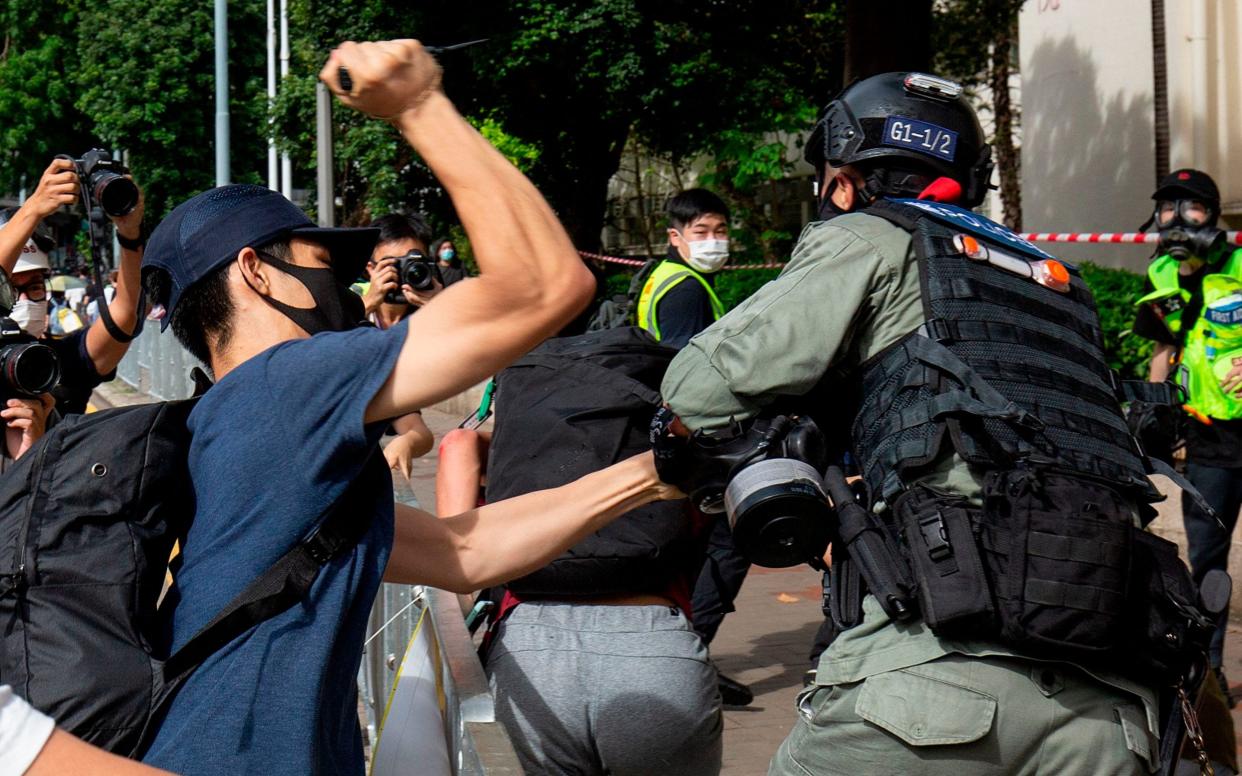China hints at tough action to stop Hong Kong residents leaving for UK

Wendy Tang, Nicola Smith and Danielle Sheridan
China yesterday raised the prospect of preventing Hong Kong citizens from taking up British residency as it upped the diplomatic ante after the UK gave the right to almost three million of them to move there permanently over Beijing’s introduction of its draconian national security law there.
In fiercely worded comments, China strongly condemned Foreign Secretary Dominic Rabb’s offer, which came after almost 400 arrests at pro-democracy protests in Hong Kong on Wednesday, ten of them under the new law. Beijing warned of a backlash.
The law, rushed through in secrecy on Tuesday night introduced life sentences or long prison terms for vaguely defined crimes linked to secession, subversion, terrorism and collusion with foreign forces. It sparked instant international condemnation.
Chinese foreign affairs spokesman Zhao Lijian told reporters: “China reaffirms that Hong Kong affairs are purely China's internal affairs and no foreign country has the right to interfere. The Chinese government is firmly determined to safeguard China's sovereignty, security and development interests."
He added that China “reserves the right to take further corresponding measures, and the UK shall bear all consequences arising from this.” Asked to specify what he meant, he said: “Please wait patiently. It is not the right timing yet”.
One diplomat with 22 years experience of working in and around China wondered if that might involve forcing all those trying to leave Hong Kong to fill in departure forms, and denying permission to fly. "But that would really be to trash the joint declaration," said Charles Parton, senior associate fellow at RUSI. Similar speculation was running on social media yesterday.
Lijian also took aim at Australia after it said it too was making plans to offer Hong Kong citizens sanctuary, and at the US, as the House of Representatives backed sanctions against China. That would hit banks like HSBC, because it supported the law’s introduction.

As Boris Johnson accused China of “plainly an unacceptable breach” of Hong Kong’s freedoms under the ‘one country, two systems’ agreement when the colony was handed back in 1997, Downing Street indicated sanctions were under consideration. Such a move is backed by Tory MPs including Tobias Ellwood, chair of the defence select committee, and former leader Iain Duncan Smith.
Mr Johnson made clear that the row could damage Chinese tech firm Huawei’s controversial involvement in the 5G network. He told The London Evening Standard: “I don’t want to see our critical national infrastructure at risk of being in any way controlled by potentially hostile state vendors. So we have to think very carefully about how to proceed now.”
Sir Iain called on the Government to launch a review into how to end the UK's "dependency on China as soon as Monday".
"It's not just about sanctions," he told The Daily Telegraph. "The free world has got to come together and do this, otherwise china will just pick people off one after another, we have to work and come together.
"Humming and harring, hesitating, is not the order of the day. They must now lead this."
He added that China needed to be "eradicated from secure areas" and added that the "Number one target is Huawei". "It's over for them and they should know it."
Taiwan on Tuesday instructed its citizens to avoid travelling to Hong Kong, Macau or China. Australia was also advising its citizens to avoid the area, telling them that it was possible to break the new without even knowing it, but that that could still lead to life imprisonment. Britain was keeping its travel advice under review, the Foreign Office said.
After news the law was coming, Hong Kong agencies were reporting a big increase in inquiries. That is now expected to gather pace.
Tina Cheng at Midland Immigration Consultancy told the Financial Times that the agency received 800 inquiries in May, double the one-month peak of 400 during 2019. “It was almost like a tsunami,” she said.
A 24-year-old man was hauled off a Cathay Pacific flight from Hong Kong to London close to midnight on Wednesday after a police officer was stabbed in the arm during the earlier protests. He had arrived at the airport without luggage, and was the only passenger to have bought his ticket that day.
And Nathan Law, one of Hong Kong's most prominent young democracy activists, announced yesterday he had fled overseas over the sweeping security law. He refused to say where he was, but said he would continue his advocacy work.
The revelation Law had left the city came as it emerged a popular protest slogan used over the last year was now illegal under Beijing's new law. "Liberate Hong Kong, Revolution of our Times" has become a clarion call for pro-democracy protesters over the last year, chanted by huge crowds and plastered on banners.In a statement, Hong Kong's government said the phrase was now illegal because it "contains the indications of Hong Kong independence, or alienating Hong Kong from China, or changing its legal status, or subverting the state" The revelation is confirmation that certain peaceful political views have become illegal since the law came into effect Tuesday night.

 Yahoo News
Yahoo News 
